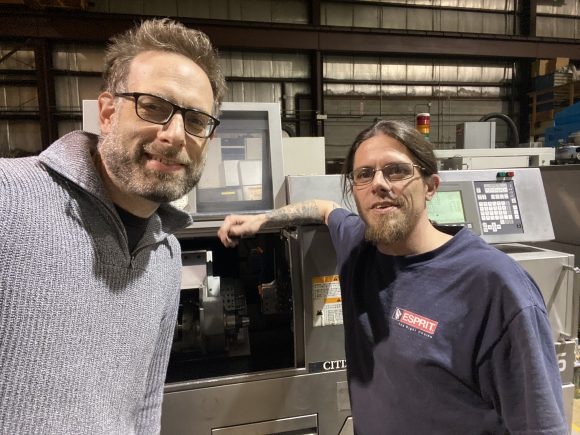Chris Armstrong has saved me more times than I can count—helping us at Graff-Pinkert through tough machinery deals, especially when it comes to Swiss machines. Citizens? He’s our guy.
But today’s podcast isn’t just about technical know-how. After years of driving coast to coast fixing machines and solving problems most people wouldn’t touch, Chris is shifting gears—rebuilding how he works, the kinds of parts he makes, and how he makes a living.
This is a story about the machining world. It’s about burnout, comebacks, and the deep, rare purpose you find when you fix things for a living.
Listen on your favorite podcast app using pod.link.
View the podcast at the bottom of this post or on our YouTube Channel
Facebook: https://www.facebook.com/swarfcast
Instagram: https://www.instagram.com/swarfcast/
LinkedIn: https://www.linkedin.com/company/todays-machining-world
Twitter: https://twitter.com/tmwswarfblog
*************
Link to Graff-Pinkert’s Acquisitions and Sales promotion!
*************
Interview Highlights
Chris has been one of Graff-Pinkert’s go-to guys for Citizen Swiss questions for years. We’ve leaned on his expertise countless times. He knows machines inside and out—but just as important, he understands people, process, and philosophy in the machining trade.
During COVID, many shops shut down. Machines sat idle. Maintenance was skipped. Skilled workers moved on. Chris saw it firsthand—not just across the country, but even in his own production shop. It wasn’t an overnight collapse, but a slow decay. And when things spun back up, they broke—ball screws failed, hoses cracked, wires frayed.
Chris became a kind of traveling emergency mechanic—reviving machines all over the U.S. (aways traveling by car). He joked that he goes “coast to coast, like butter and toast.” But even as he fixes other people’s shops, he has been laying the groundwork for something new of his own.
And I’m proud to say: our we played a small part in it.
A few months back, Graff-Pinkert sold Chris three beautiful Swiss machines we had imported from Japan—a Citizen L20, an A20, and a DMG MORI Sprint 32/5. Here’s the full-circle part: Chris was actually the one who got those machines running when they arrived at our shop. He tuned them up, brought them back to life—and eventually, brought them home.
Now, he’s using them to make high-pressure water components, intricate fittings for chip-making infrastructure, and parts out of notoriously nasty materials like Hastelloy. Not high-volume widgets. These are the kinds of jobs that require experience, intuition, and relentless attention to detail.
In our conversation, Chris talks about the profound satisfaction of transforming a beat-up machine into something shiny and singing again. We discuss “good cop/bad cop” dynamics in management, the importance of clear communication on the shop floor, and why sloppy math still drives him nuts.
We also talk about what it means to take pride in your craft—not just to produce parts, but to teach, to serve, and to show up. For Chris, that’s not just a business model. It’s a calling.
If you’re into Swiss machining, small business grit, or stories of rebuilding from the inside out, this episode is for you.
Podcast: Play in new window | Download




2 Comments
It’s good to hear about people’s experience from the machining field of activities
Thanks for commenting. You are next!